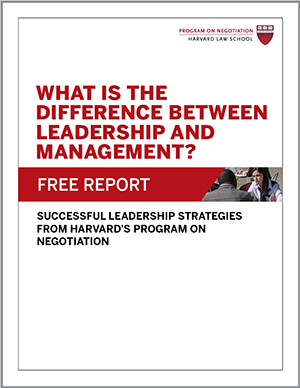
Major-league sports franchises in the United States have a history of moving from town to town in search of bigger markets and higher profits—often breaking hearts and promises in the process. The story of how the National Football League (NFL) team formerly known as the St. Louis Rams came to move to Los Angeles in 2016 highlights the risks of violating key leadership principles and illustrates the role of leadership in negotiation and decision making.
A Negotiation Blitz
In 2013, Rams owner E. Stanley Kroenke bought California land well suited for a potential stadium, concerning fans that he was preparing to relocate the team from St. Louis. The governor of Missouri at the time, Jay Nixon, formed a task force co-chaired by an influential local attorney, Bob Blitz, aimed at convincing the Rams to stay put.
Blitz, whom the New York Times calls “the ultimate fix-it man in his native St. Louis,” had been part of the team that enticed the Rams to move from Anaheim, California, to Missouri in 1995 and had represented the Rams’ stadium, The Dome, for over 20 years. Believing the Rams were open to staying in St. Louis, Blitz helped secure financial commitments from public officials for a new $1.1 billion riverfront stadium for the team. Local governments spent $17 million on designs and plans for the stadium.
But the Rams nonetheless continued with plans to move. In January 2016, NFL owners voted 30–2 to allow the team to relocate. The league gave St. Louis fans no explanation for the decision.
Putting Leadership Principles to the Test
In 2017, a team of lawyers, including Blitz, sued the league on behalf of the city and county of St. Louis and the operators of the Rams’ former stadium. The NFL, they argued, had failed to adhere to its own leadership principles, namely its guidelines for deciding when to authorize a relocation.
In the late 1990s, the NFL and the United States Conference of Mayors had jointly negotiated objective criteria governing franchise relocations, reports Daniel Wallach in the blog Conduct Detrimental. The parties created a Joint Statement of Principles aimed at protecting cities and the NFL and its member teams from the burdens of a franchise relocation.
The principles stated that NFL decisions should be made based on publicly available “objective criteria that account for the interest of fans, communities, taxpayers, and owners.” The 10 principles called for the parties to consider the condition of the team’s current stadium, existing fan and financial support for the team, the team’s financial performance, and other issues. The parties also stipulated that the community in which the team is currently located should be allowed to engage in good-faith negotiations to keep it.
According to these leadership principles, any team seeking to relocate would need to request approval from the NFL and notify local authorities at least six months before a possible move. The NFL would then need to hold a public hearing in the home community and share its findings regarding a relocation decision publicly.
The NFL incorporated the principles into its relocation policy, and decades later, the Rams relied on them to support its request to the NFL to move the team to Los Angeles. But, according to the plaintiffs in the Rams case, the NFL didn’t follow its own guidelines—which, they argued, were legally binding. In particular, the St. Louis lawyers believed the NFL, contrary to an inclusive leadership style, had not bargained in good faith with those who put together the deal for a new stadium in their city or sought out collaborative solutions with the community.
The Agony of Defeat
In a deposition, NFL commissioner Roger Goodell gave evasive answers when grilled about whether NFL team owners followed the relocation guidelines. And in July 2021, St. Louis Circuit Judge Christopher McGraugh ruled that several NFL owners would need to disclose financial information about their teams because they could be personally liable for punitive damages, the Times reports. When the owners failed to comply, Judge McGraugh slapped them with fines. The league successfully petitioned to have Blitz removed from the case, but that move could well have backfired, as it would have allowed the plaintiffs to call him, with his inside knowledge of the case, as a witness.
For the NFL, the writing was on the wall. Fearful of losing in court and setting an unfavorable precedent, the league negotiated a settlement, agreeing to pay the city and county of St. Louis $790 million in damages. Rams owner Kroenke was expected to be personally responsible for paying all or most of the settlement. The Times called the agreement a “rare and very public defeat for the NFL.”
The case illustrates what can happen when a party to a negotiation violates key leadership principles, including the importance of following through on promises during the implementation stage. Effective leadership skills include the ability to stay cognizant of the legal, financial, and relational perils of violating agreed-upon terms. By adhering closely to the negotiated playbook, we can demonstrate principles of ethical leadership.
What key leadership principles have you seen violated in negotiation?





